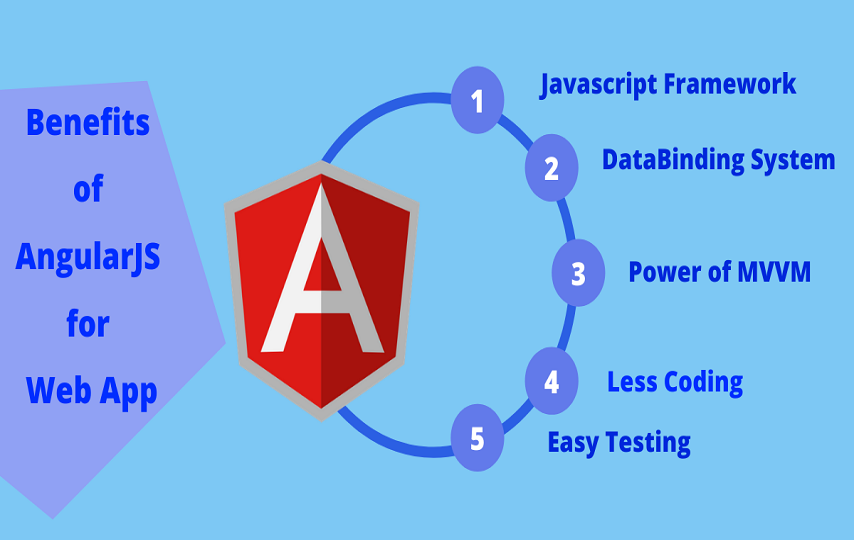There are different frameworks available through which you can develop a web app for your company. One such framework is AngularJS.
Companies widely use this framework to create their own web app.
To understand why this framework is so popular and why companies are investing so heavily in Angular JS development to create web apps, we need to dig a bit deeper.
What is Angular JS?
Angular JS is an open-source front-end JavaScript framework that is created and maintained by Google to provide solutions to developers facing any challenges while developing and testing codes.
It integrates HTML codes and application modules to form a robust framework.
As this open-source framework is based on the Model View Controller (MVC) architecture, it is generally used to create highly functional web applications.
The latest launch of Angular 2 has given the developers a greater leeway in trying out innovative ideas to create an even better web apps with greater functionalities and features.
Additionally, it reduces the use of JavaScript to build any web application.
Compared to other frameworks, in the Angular JS, the mark-up resides in the DOM. Furthermore, this framework utilizes plain old JavaScript objects and it also uses dependency injections.
Here are 15 Top Benefits of choosing AngularJS for Web App
Reason Why you should hire Angular JS developers
1). Simple and robust architecture:
AngularJS has a simple architecture with enough flexibility to allow the developer to add or enhance any feature in the web app as per the demand of their clients.
The simple architecture of this framework makes it easier to create feature-rich applications compared to some other frameworks which have a complex design and component requirements.
The architecture of this framework is such that even if a new programmer joins a project midway, he/she can easily manage to locate and develop the code without much difficulty.
2). Model-View-View Model (MVVM) design pattern:
The Angular JS gives the developer the advantage of breaking the application into MVC components and let the framework take care of the rest.
It uses elements and integrates them by using a two-way binding called the MVVM design pattern.
3). Angular directives:
Directives are JavaScript components that create HTML tags, attributes, or CSS class with your name.
They act as a DSL language element in the page which helps in code reusability and creates extra functionality in HTML without leading to any complications.
4). Filters:
The Angular JS has filters which are designed like standalone functions that are separate from the app which takes care of the handling of the data before it reaches the view.
These are specifically focused on data transformations.
This framework allows the developer to create custom filters to improve data flexibility and allows the developer to deal with HTML table without taking any help from JavaScript.
5). Dependency Injections:
In this framework, the objects are given their dependencies in place of hard coding them in the objects. This makes the dependencies easy to configure. This entire process is known as dependency injection.
It allows passing on any dependency to a component whatever it needs without the need for a constructor. This makes the web app fast as well as fluid.
6) Controller:
The Angular JS allows the controllers to regulate and provide data to the view. This makes the process simplified when creating or integrating any subsystem.
It also helps the developer to control specific view data without needing other components. The controller also helps in dependency injection.
7). Top-down approach:
Unlike other frameworks, AngularJS uses the top-down approach. In such a process, the main module of the application is first created and then the supporting modules are built in parallel.
This type of approach makes the entire software system a single entity which is further subdivided into one or more subsystems/components.
Each of these subsystems would be considered as a system and as required they are subdivided further till the lowest level of the system is reached.
Due to this approach only, Hire AngularJS developers are able to develop any app with ease.
8). Client-side rendering:
AngularJS support caching that allows the developer to cache any unchanged data when the request is made.
This improves the traffic leading to faster response to API calls. Furthermore, caching improves server performance significantly.
This framework is used as a client-side rendering wherein it fetches the HTML template.
The angular JS in the client-side creates the HTML structure due to which the server side does not create any HTML structure.
This improves server performance and reduces the data consumption significantly.
9). Service providers:
In AngularJS, the service providers are used to share data as well as functions between different controllers.
As service providers are objects, the developer can use their object functionality for any controller of the application.
10). It takes less time and also minimum coding:
In AngularJS, the developer doesn’t have to write their own MVC pipeline.
Using this framework is easier to write data models because they do not need any getters or setters.
Furthermore, data binding allows the data put on view automatically. In the event of any change in the controller, it will impact the Dom and vice versa.
Therefore, the developer does not need to write any functionalities which result in less code and faster performance of the web app.
11). Easy validation: Another advantage of using Angular JS is that it comes with an inbuilt form validation capability.
You can use the inbuilt validation to make any custom validation.
Additionally, the AngularJS form controller keeps a proper record of the form on the page and you can use this data to give different behaviour to the HTML element in the UI.
This helps in displaying any error messages for individual fields or even the whole form (if there are any).
12). Advantage of modules: The Angular JS is composed of different modules which can be either dependent on other modules or autonomous in nature.
These different modules allow the developer to build a normal login, or even Facebook login separately and then combine these two using the root application.
13). Ready-made solutions: Angular JS can perform various tasks instantly through ready-made solutions.
The angular JS does not have any specific project structure and the developer can use their own project structure to build hybrid applications.
14). Data binding: The data binding capability of AngularJS saves a lot of time since the developer has to use minimum code.
Whenever any changes made to the user interface, it will reflect automatically in the view and any change that change happens, it changes the application object automatically as well as update the requisite patterns.
The model view data binding process of AngularJS allows the developer to use either one way or two-way data binding as per your requirement.
15). Easy testing: In AngularJS, the testing of an application is very easy, wherein you can test both individual modules as well as the full application.
As you can test individual modules, you get the flexibility to tweak their features and test them again. Thus, if an error occurs, then instead of testing the entire application you can check a module and fix it.
These are just some of the important features which make AngularJS such a popular framework to create a web application from scratch.








